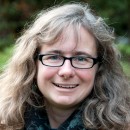Wendy Call
Nonfiction

- Biography
Biography
Wendy Call (she/ella) is author, co-editor, or translator of nine books. She co-edited the craft anthology Telling True Stories: A Nonfiction Writers’ Guide (Penguin, 2007) and is co-founder and co-editor of the annual Best Literary Translations, published each spring by Deep Vellum. She wrote No Word for Welcome: The Mexican Village Faces the Global Economy (Nebraska, 2011), winner of the Grub Street Book Prize and International Latino book Award, and the chapbook Tilled Paths Through Wilds of Thought (MBR/K2, 2012). She has translated three books of poems by Mexican-Zapotec poet Irma Pineda, with whom she shared the 2022 John Frederick Nims Prize for Translation from the Poetry Foundation. Her co-translation of How to be a Good Savage and Other Poems (Milkweed, 2024), by Zoque poet Mikeas Sánchez, was called “a significant work in more ways than one” by the New York Times, and won the 2024 Gold Medal for Best Translation from the International Latino Book Awards. Wendy has received grants and fellowships for her creative nonfiction from 4Culture, Artist Trust, the Seattle City/Artist Program, and the Wurlitzer Foundation. Fellowships for her poetry translations have come from Cornell University, Fulbright Commission, National Endowment for the Arts, and University of Iowa. She has served as Artist/Translator/Writer in Residence at 29 institutions, including universities, national parks, visual arts centers, and a public hospital. Wendy writes, edits, and translates books in Seattle, on Duwamish land, and in Oaxaca, on Mixtec and Zapotec land.
Mentor: Workshops and classes in nonfiction
Statement: When I was ten years old, a friend’s father told me, “We are changed by every interaction we have in our lives. Every person you meet will change you in some way.” I listened to his words from the back seat of his huge sedan as we drove through the mountains, a nighttime Pacific forest visible through scratched windows. The magnitude of the idea settled over me as we moved past enormous, centuries-old trees. I imagined myself at age 30, 40, 50: my identity composed of what I’d received from other people. A deep sense of liberation and relief washed over me: I was no longer solely responsible for the person I became. And I would never be truly alone, because I would carry those bits of other people within me. I discovered my vocation as a writer in that moment, though it would take me another eighteen years realize it.
I remember that man’s words each time I enter a writing workshop or offer feedback on a writer’s work. Though both of my parents were teachers, I never imagined that I would become one—I understood only too well the wide skill set the profession demanded. I worked for fifteen years as a freelance writer and editor, and before that, ten years as a grassroots organizer. During my decade as a grassroots organizer, I led several intensive training programs for new organizers. I never thought of that work as “teaching.” In the tradition of Paulo Freire, I was simply helping people discover what they already knew. I finally came to understand that’s what teaching creative writing is.
My job as a writing mentor is to bring the toolbox, both literal and metaphorical. It might include kitchen utensils, glue stick and scissors, postcards, advertisements, original works of art, bottled scents, raw vegetables, or items from a recycle bin or thrift shop. It includes world literature, direct engagement with working writers, and concepts borrowed from linguistics, anthropology, sociology, and ecology. I open the box, pass around the tools, and we build things (good, not-so-good, and most of all, instructive) together.



Social Media